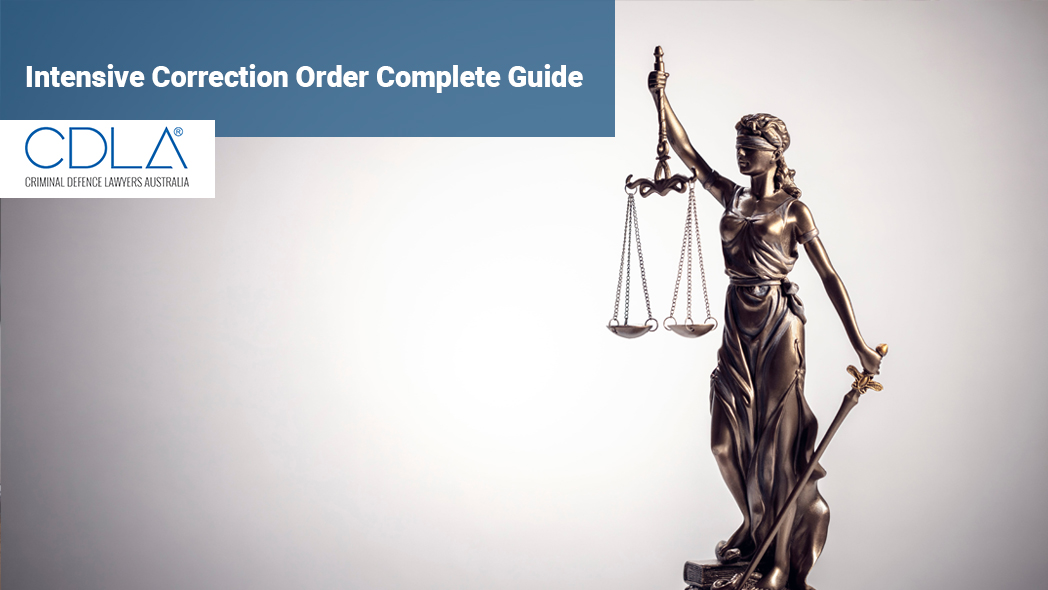An intensive corrections order is also referred to as an “ICO”. It is an alternative to full time prison.
An ICO is considered a sentence of imprisonment with a criminal conviction where you don’t actually go to prison. You remain in the community with certain conditions.
Generally, the court will be more likely to give you an ICO sentence if:
- You pass the eligibility requirements of an ICO (explained below); and
- The Judge believes that an ICO order with certain conditions can be imposed to address your risk of reoffending. Those conditions can include community supervision and programs.
An ICO sentence is usually available to more serious cases when the court is considering on sending you to full time prison but doesn’t.
The court won’t send you to full time prison if it can find reasons not to (by therefore imposing an ICO as a type of imprisonment instead). A good reason is where the court believes that an ICO with appropriate conditions would more likely address the risk of you re-offending, instead of sending you to jail.
An ICO is considered an alternative to full time prison. Here, you don’t go to prison, instead, you remain in the community with certain conditions and supervision by a community corrections officer.
The purpose of imposing conditions and supervision is to address your offending conduct, and to address the reasons why you did it in the first place. The aim is to rehabilitate you which results in a benefit to the community safety (by reducing the risk of you re-offending).
FAQ
- The 2 years rule: For a single offence, you can only be eligible for an intensive corrections order if the Court concludes that it will impose a term of imprisonment of 2 years or less.
This means that if the Court gives you a term of imprisonment of more than 2 years for an offence, you will not be allowed to get an intensive corrections order. It’s important to try to convince a Judge to impose a sentence of less than 2 years imprisonment so that you can be eligible for an ICO (instead of full time prison).
However, where you’re being sentenced for multiple offences, the court can only be allowed to impose an intensive corrections order if the aggregate term of imprisonment it considers imposing is 3 years or less in total.
- Risk of Re-offending: The court is mainly concerned with community safety. You can only get an intensive corrections order if the court considers that an intensive corrections order is more likely (as oppose to prison) to address your risk of reoffending.
For example, the court may consider an ICO more appropriate than sending you to prison where community based treatments are available to address the factors that contributed to you committing the offence(s). A drug or alcohol addiction could be a reason for your offending which can be addressed with a condition that you receive community treatment such as alcohol or drug counselling.
- Certain Offences: The Court is not allowed to give an intensive corrections order to the following very serious offences:
- Manslaughter or murder
- Prescribed sexual offences, including offences where the victim is under 16 years of age, child pornography or child abuse material.
- Terrorism offences
- Discharge of firearms offences
- Assessment Report: Before the court can make an intensive corrections order, the Judge must first obtain and have regard to an assessment report. The Court can only then order an ICO as a sentence if the assessment report expresses that you’re suitable to serve the sentence by way of an ICO.
The assessment report will guide the Court in imposing appropriate conditions or restrictions designed to address the risk of reoffending. Those conditions will be conditions to address the reasons for why you committed the offence.
However, the Judge isn’t obliged to give you an ICO even if the ICO assessment report says that you’re suitable for an ICO. The Judge can refuse to impose an ICO as a sentence if he/she believes that you’re not a suitable person to serve it in this way.
An assessment report can take up to 8 weeks to prepare.
Generally, every Intensive Corrections Order must impose on you the following standard conditions:
- You must not commit a further offence during the term of the order; and
- You must comply with being supervised by a community correction officer.
In addition to the above 2 standard orders, the court must also impose any 1 of the following additional orders:
- Home detention condition
- Electronic monitoring condition
- Imposing curfews i.e. you are not to be absent from your home between certain hours of the day
- Community service order where you are required to perform a certain number of hours of community work (it cannot be more than 750 hours)
- Requirement you are to participate in treatment or rehabilitation program i.e. psychologist or counselling
- Condition where you are prohibited from contacting certain people
- Conditions prohibiting you from frequenting or visiting certain place(s) or areas.
In certain situations, the assessment report may express that you’re not suitable for home detention, or community service work.
If this happens to you, then the court is not allowed to impose those conditions.
The court will not impose a home detention condition on you if the assessment report says that you’re not suitable for home detention.
If the offence is a domestic violence offence and the victim to the domestic violence will live with you, the Judge may only give you an ICO if the victim will be adequately protected by imposing appropriate conditions on you.
You will be considered unsuitable for home detention where:
- The victim to the domestic violence will be living with you.
The court will not be able to impose a community service order condition if the assessment report expresses that you’re not suitable for this due to your physical restrictions or because of your work commitments.
Generally, only those additional conditions that address the risk of re-offending will be outlined in the assessment report.
Section 81A of the Crimes (Administration of Sentences) Act 1999 (NSW) allows the offender or the community corrections officer to apply to the Parole Authority to impose conditions or change or revoke any conditions of the ICO.
The community corrections officer can suspend the ICO conditions for a certain period of time under section 82A of the Crimes (Administration of Sentences) Act 1999 (NSW).
The only conditions of an ICO that can be suspended include:
- Conditions to comply with supervisions by a community corrections officer, and any of the additional ICO conditions.
If the community corrections officer agrees to suspend the ICO conditions for a limited time, the suspension may or may not be subject to conditions.
Under section 163 of the Crimes (Administration of Sentences) Act 1999 (NSW), a community corrections officer can do any of the following things if you fail to comply with the conditions of an ICO:
- Take no action, but record the breach.
- Give an informal warning and record the breach.
- Record the breach and give a formal warning advising you that a further breach will cause a referral straight to the Parole Authority.
- Give a reasonable direction to you relating to the type of conduct by you that caused the breach in addition to recording the breach.
- Impose a curfew of up to 12 hours in a twenty four hour period, and record the breach.
- Refer your breach to the Parole Authority due to the seriousness of the breach. The community corrections officer may also suggest what action the Parole Authority may take.
Under section 164 of the Crimes (Administration of Sentences) Act 1999 (NSW), the Parole Authority can do any of the following if it believes you’ve breached a condition of an ICO:
- Take no action, but record the breach.
- Take no action but provide you with a formal warning, and record the breach.
- Record the breach and impose conditions on the ICO. This includes any of the following conditions:
- That you remain in your home for a period of up to 30 days.
- Comply with the use of an electronic monitoring device.
- Record the breach, and change or revoke certain conditions of the ICO. The standard conditions cannot be revoked or changed.
Record the breach and Revoke the ICO.
If the Parole Authority revokes your ICO as a result of a breach of the ICO conditions, then the ICO sentence ceases. You will then be required to serve the sentence full time in prison.
After your ICO gets revoked, you can still make an application to the Parole Authority to reinstate your revoked ICO order under section 165 of the Crimes (Administration of Sentences) Act 1999 (NSW).
If successful, you’ll be released from prison, and you’ll then be required to serve the remainder of your sentence in compliance with the ICO conditions.
You can only make an application to the Parole Authority for reinstating your ICO after having served at least 1 month in prison. In making the application you also need to outline what you have done or are doing to comply with the ICO conditions if it gets reinstated.
After making the application to reinstate your revoked ICO, the Parole Authority will normally adjourn your case for an assessment report as to whether your still suitable for an ICO. Your community corrections officer will then draft a report for the Parole Authority after interviewing you.
If the assessment report comes back as suitable for ICO, then the Parole Authority will normally reinstate your ICO, releasing you from full time custody.






